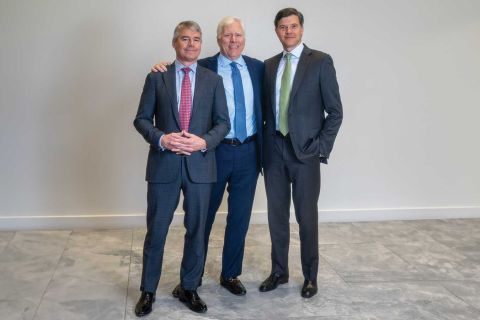In today's energy industry, college degrees or years of on-the-job experience are no longer the last word in expertise; it is specialized knowledge that counts. Employees are being asked to wear a variety of hats due to labor shortages, time crunches and keeping up with the competition. More companies than ever are turning to new training methods to revamp the skills of personnel from the mailroom to the boardroom. "The profile of the very successful oilman is changing," says the vice president of a Houston-based independent. "It used to be all about having good hunches on drilling projects." But now, the perfect company man may now be a cross between J.R. Ewing, Bill Gates and Henry Kissinger: business-savvy, computer-literate, can discuss the latest abstract technical theories, and can think globally and worry about the environment. "He-or she-can look at the big picture, from the concept of an exploration project through to the refining and marketing stages. He knows a little bit about everything, and a lot about at least one specialty. He can talk to investors and maneuver around the cultural differences of foreign oil companies. That's a tall order to fill, and a lot of us old-timers are struggling with that." Taking advantage of this new ideal, the number of companies offering energy industry training has doubled in the past few years. In fact, one training company claims it has at least 200 competitors that offer similar oil and gas training services, not including programs offered by various government entities. Methods run the gamut of every medium currently available-and some are just in the concept stage. During the late 1960s, formalized training for geoscientists outside of schools and professional organizations began to catch on. Oil companies were looking for a way to pick the brains of competitors, as well as share ideas and discuss new methodology. A number of training companies sprang up, including Oklahoma-based Oil & Gas Consultants International , which boasts of being the oldest professional training corporation in the world, according to OGCI business development manager Richard Reese. "Originally, we focused solely on high-end geological, geophysical and engineering training," Reese says. "Our founding fathers, Thomas Allen and Alan Roberts, both left Exxon Production Research to form OGCI. They are considered the pioneers of short courses and industry seminars." Early courses consisted primarily of lectures, with the occasional field trip. Some organizations began to publish the notes of instructors, which led to mass production of standardized textbooks. The availability of videotape in the mid-1970s brought carefully scripted training programs into the corporate libraries of major oil companies. Boston-based International Human Resources Development Corp. immediately shifted its focus to the new medium. "Our video production period began with two major objectives," says IHRDC founder David Donohue. "We wanted to provide innovative forms of training to individuals wherever the need existed, and we needed to develop products that sold for a higher margin than books." IHRDC's first video series was produced in conjunction with Phillips Petroleum . By the time the price crunch of the mid-1980s occurred, the oil industry began slashing budgets, and training, along with personnel, were among the first cut. "During boom days, people believed that if they drilled a dry hole, it was no big deal, there was plenty more money where that came from," says Daniel Tearpock, founder of Houston-based Subsurface Consultants & Associates . "They were wrong then and are still wrong today. You just cannot shortcut the scientific work and expect to be a winner." SCA expanded its training services to include the latest in technology and began to offer consulting services in addition to training. Its first international project led to the discovery of 1.3 billion barrels of oil and 9 trillion cubic feet of gas in Venezuela. Other training companies saw the value of adding consulting to their list of services, and soon the two functions were offered simultaneously by a number of other firms. Sometimes key training is only as far away as a local government office. For instance, the Pennsylvania Bureau of Oil & Gas Management is one of several state agencies that offer selected courses on an as-needed basis, says the PBOGM's Dave English. "We look at typical violations or problems locally and design courses and workshops to address these issues. We noticed that many operators and site constructors were having a problem with erosion, for instance, so we set up a series of workshops to address this issue." The courses are free of charge and are coordinated with operators, industry associations and the state, and they are conducted during quarterly industry meetings. In Canada the industry has pooled resources to form the Petroleum Industry Training Service, a nonprofit organization established, owned, directed and partially funded by six petroleum associations. Recognized internationally for its world-class training, PITS offers a wide variety of courses, correspondence programs, publications, consulting, customized training and other services related to petroleum technology, safety, the environment and career development. Industry experts develop and deliver PITS' hands-on training onsite for operators or in PITS' own training facilities, which are in Alberta and Nova Scotia. In the U.K. In the maturing oil provinces of the U.K., Opito, the national training organization for oil and gas extraction, takes a strategic role in identifying current and future skills needs and takes responsibility on behalf of the offshore industry for key safety and emergency training. Opito represents employers, trade unions and academia, offering guidance and a variety of courses and materials that focus on improving the competitiveness of the U.K. oil sector as it goes head-to-head with lower-cost E&P areas like the Gulf of Mexico and the Far East. Not all energy companies believe their training needs can be fulfilled from the outside. Some prefer to design in-house programs. For example, Conoco takes a long-term view in the development of its staff. Through its Conoco University, the Houston-based major offers a series of workshops, group seminars and forums on subjects like leadership skills, business literacy and personal development, much of it done through the Internet. "Many companies focus on fulfilling short-term requirements without thinking about what the future might hold," comments Conoco vice president of human resources Tom Knudson. "We ask ourselves what Conoco will be like 20 years from now-what kind of people, skills, characteristics we might need-and then we set about developing a road map." A growing number of majors are joining with outside vendors to fit their needs. One such alliance is PetroSkills , a joint venture of Shell , BP and Oil & Gas Consultants International . The two majors are working toward outsourcing the majority of their E&P training to PetroSkills within the next five years. In fact, Shell recently closed its Houston training center and has consolidated the remainder of its in-house training at headquarters in the Netherlands. "PetroSkills was created because Shell and BP needed a way to outsource their E&P training while still maintaining close control over the content and types of courses offered," explains OGCI's Reese. "By forming PetroSkills, the high quality is still guaranteed and maintained, but they don't have the hassles of coordinating so many in-house programs." At PetroSkills, Shell and BP supply courses and instructors, and OGCI staffs the office and training facilities and handles administration. "The neat thing is that now everybody in the industry can attend these very elite courses that were previously open only to Shell or BP employees," Reese says. "Except for certain confidential courses-and usually these are based on proprietary software-the companies are allowing industry to partake of training, research and knowledge that was previously held very close to the vest." Service companies are also getting into the training act. A recently formed entity, Network of Excellence in Training , or NexT, by Schlumberger and several noted universities is also attracting a large portion of training budgets. "I think a good part of Schlumberger's success is probably owed to the high profile they have given to training," says NExT chairman Peter Goode. "It was a natural evolution to form a separate, outside training entity, and because of the high level of interaction Schlumberger maintains with top-quality universities around the world, it was only natural for the company to join forces with them." NExT's partnership with universities is "the key to our unprecedented and innovative way to impart specialized training," adds Chuck Sargent, director of curriculum at Heriot Watt University in Edinburgh, Scotland, one of the NExT alliance partners. NExT's methods are so unique, they say, that they have filed for patents on their business and training methods. When training becomes part of a contractual operating agreement with a foreign government, outfits like Baker Energy can provide a one-stop-shop for foreign operators, says Baker Energy president Michael Whitten. "We have the unique ability to help companies fulfill contractual requirements in foreign countries by providing nationalization training right on site," says Whitten. "Most host governments require a certain amount of local employment from foreign operators. Our training division uses expert staff to train locals to run all facets of production operations." Latest technology Today, training companies are working harder than ever to provide functional courses using the latest technology-both as subject matter and as a way to deliver the programs. Most companies have graduated from textbooks and video courses to CDs and other computer-based training, making it easier than ever for busy staffers to keep up to date with the latest the industry has to offer. CD libraries stored on "jukeboxes" or even accessed via the Internet are becoming the norm in new training options. Denver-based IHS Engineering even offers constantly updated, interactive engineering textbooks via the Internet to help students of all levels keep up with ever-changing technical advances. Unocal is taking advantage of the latest trend, as its chief exploitation geophysicist in Indonesia, Dan Maguire, explains. "Balikpapan is a remote location that makes sending people to training or bringing training classes in-house very expensive and time consuming." For some time, Unocal had been looking for ways to improve the effectiveness of its training and competency-development methods. "We began to rely on a combination of formal classroom, one-on-one, computer-based and on-the-job training, as well as mentoring." To address some of the observed shortcomings, Unocal chose IHRDC's Internet-based learning systems, Ipims, as a means to enhance development within the remote organization. "If someone needs a full course in a subject area, or if the individual just needs an hour or two to brush up on a subject, Ipims is there as a resource 24 hours a day, seven days a week," Maguire says. "And, as many of our employees are not native English speakers, Ipims allows them to review subjects or slow down if language comprehension is an issue." Need to upgrade people skills but don't have time to attend a course? Another option, telelearning, requires registration and download of course materials from Comprehensive Coaching U' s Internet web site, after which the participant will dial in via telephone for weekly learning sessions. "Telelearning is clearly the way to go," says CCU founder Terri Levine. "Scheduling is flexible and convenient. Students can 'go to class' while they're at their desks during lunch or lying on the sofa after work." Whatever method used, there is no question that energy companies are jumping on the training bandwagon in record numbers. "The recent mergers and acquisitions craze has wreaked havoc on our personnel," says the human resources director of a small upstream company. "We've been left with some eggheads who have loads of experience but no concept of the latest technology, and some fresh-faced virgins straight from the college dorms who are whizzes on computers and workstations but have no idea how to actually find oil, or what to do with it if they do. It's no wonder we have to re-educate our staff. We need to, if we want to make a profit."
Recommended Reading
Petrie Partners: A Small Wonder
2024-02-01 - Petrie Partners may not be the biggest or flashiest investment bank on the block, but after over two decades, its executives have been around the block more than most.
Chesapeake Slashing Drilling Activity, Output Amid Low NatGas Prices
2024-02-20 - With natural gas markets still oversupplied and commodity prices low, gas producer Chesapeake Energy plans to start cutting rigs and frac crews in March.
Matador Resources Announces Quarterly Cash Dividend
2024-04-18 - Matador Resources’ dividend is payable on June 7 to shareholders of record by May 17.
CEO: Coterra ‘Deeply Curious’ on M&A Amid E&P Consolidation Wave
2024-02-26 - Coterra Energy has yet to get in on the large-scale M&A wave sweeping across the Lower 48—but CEO Tom Jorden said Coterra is keeping an eye on acquisition opportunities.
CEO: Magnolia Hunting Giddings Bolt-ons that ‘Pack a Punch’ in ‘24
2024-02-16 - Magnolia Oil & Gas plans to boost production volumes in the single digits this year, with the majority of the growth coming from the Giddings Field.





